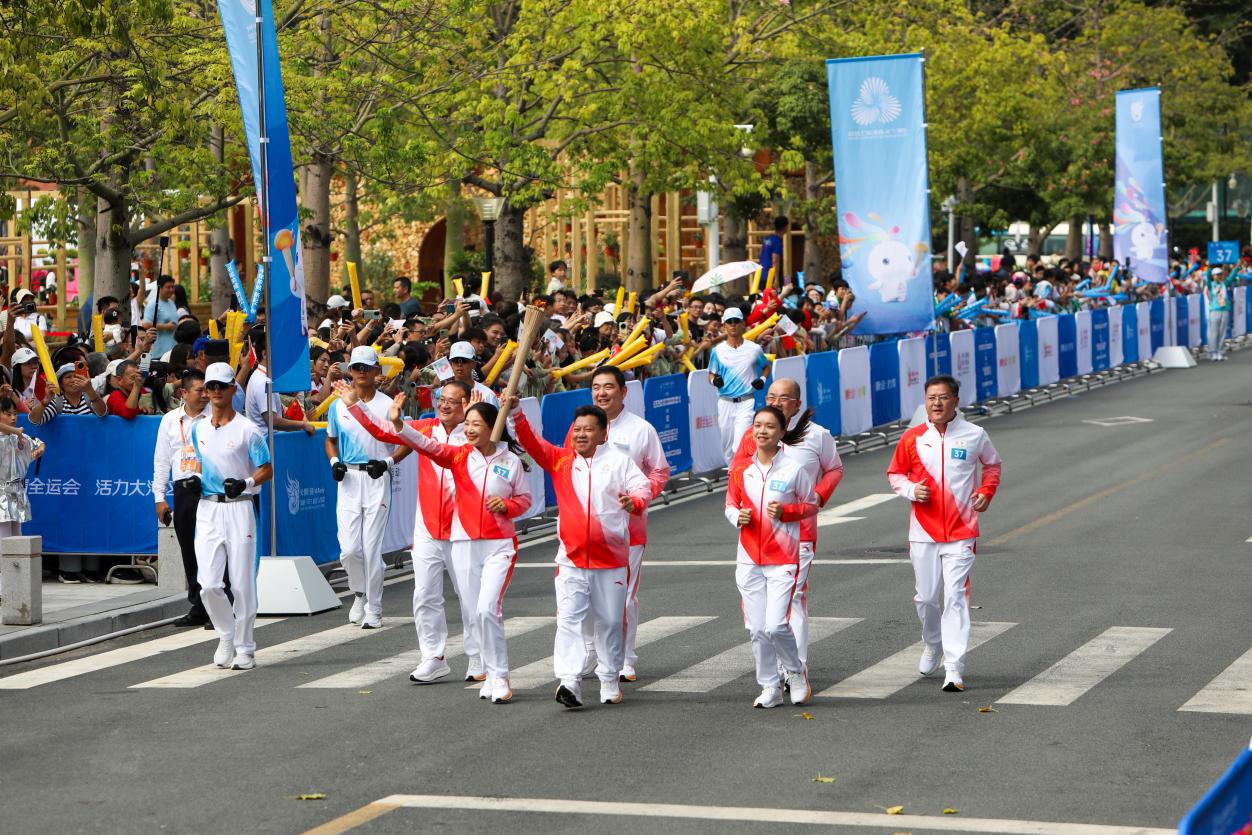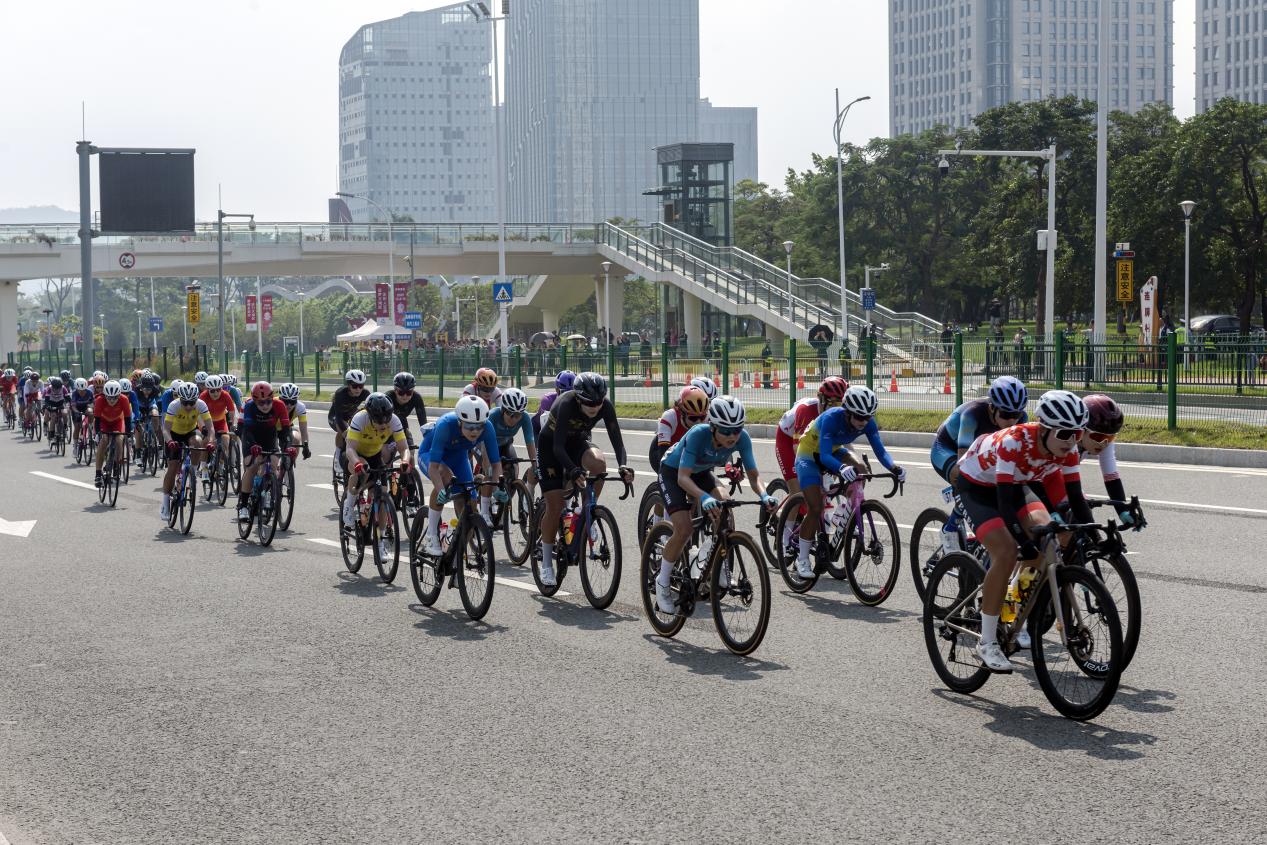




- BRNN
- BRI News
- BRNN News
- Database
Official Documents Polices and Regulations
Inter-government Documents International Cooperation BRI Countries
Business Guide Economic Data BRI Data
Trade
Investment Projects Latest projects
Cases - Content Pool

Torchbearers take part in the torch relay of China's 15th National Games in Guangzhou, south China's Guangdong province, Nov. 2, 2025. (Photo/Chen Zhiqiang)
China's 15th National Games transcends being merely a grand sporting spectacle; it serves as a dynamic platform showcasing the deepening integration within the Guangdong-Hong Kong-Macao Greater Bay Area (GBA).
During the Games' opening ceremony, the symbolic flowers representing the three regions - Guangdong's kapok, Hong Kong's bauhinia and Macao's lotus - converged into a concentric floral pattern, powerfully embodying their unity. The pulse of the GBA resonated throughout the celebrations, visible from Guangzhou's gleaming skyline to Hong Kong's Victoria Harbour and the historic Ruins of St. Paul's in Macao.
The recommendations for formulating the 15th Five-Year Plan (2026-2030) highlight the importance of consolidating and enhancing the GBA as a powerhouse of high-quality development. The document calls for stronger efforts to support Hong Kong and Macao in better integrating into and contributing to the country's overall progress, while enhancing cooperation with the mainland across economic, trade, scientific, technological, cultural, and other fields.
To advance these goals, the Central Committee of the Communist Party of China and the State Council designated Guangdong, Hong Kong, and Macao as co-hosts of the Games, a pioneering practice of "one country, two systems" in the realm of sports. The experience of joint organization across the three regions is helping build valuable models for broader and deeper regional integration.

The Women's Road Cycling Individual of China's 15th National Games is held in Zhuhai, south China's Guangdong province, Nov. 9, 2025. (Photo/Deng Guohui)
A striking example of this cooperation was the men's road cycling race. Its 230-kilometer course started in Zhuhai, Guangdong province, crossed a bridge into Macao, traversed the Hong Kong-Zhuhai-Macao Bridge to Lantau Island in Hong Kong, and returned via the same bridge back to Zhuhai - physically linking all three regions within half a day.
Throughout the race, cyclists passed seamlessly through the bridge's three checkpoints six times - without stops, document checks, or security screenings. The "zero delay, zero contact, zero waiting" process was a testament to the GBA's institutional innovation.
"The key lies in a 'pre-verification and closed-loop management' system," explained Yuan Xiong, deputy director of the executive committee office for the Zhuhai division of the Games. "With dedicated communication networks, satellite positioning, UAV (unmanned aerial vehicle) filming, and RFID (radio-frequency identification) tracking technologies, the entire process was digitally monitored and coordinated to ensure smooth passage for people, vehicles, and equipment."
During the Games and Para Games, more than 9,000 participants are expected to travel across the three regions - a significant test of organizational and logistical capacity.
"For delegations, we set up dedicated lanes at border crossings to allow group entry and exit on demand. For ticket holders, we opened green channels, enabled cross-region processing of travel documents, and offered expedited services for those with urgent needs," said Zhang Zhihua, an official overseeing the Games' coordination work with Hong Kong and Macao.
Behind this high level of efficiency are innovative mechanisms that enable unified handling of matters, policies, and regulations across Guangdong, Hong Kong, and Macao.
"This cross-regional model not only enhanced the GBA's ability to host large-scale events, but also strengthened bonds among people and promoted the integration of sports, culture, and tourism," said Yeung Tak-Keung, head of the Hong Kong coordination office for the Games.
By using sports as a bridge and events as a shared platform, the Games has brought together Guangdong, Hong Kong, and Macao, which share the same cultural roots, close people-to-people bonds, and similar traditions. The joint hosting ignited a powerful current of innovation, collaboration, and unity, forming a driving force that continues to shape the GBA into a dynamic, world-class metropolis cluster.
The flame of innovation, the torch of collaboration, and the light of integration kindled by the Games will continue to illuminate the GBA's path forward, empowering it to evolve into a truly international first-class bay area and a world-leading urban cluster.

Tel:86-10-65363107, 86-10-65368220, 86-10-65363106